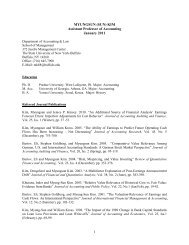Organizational Behavior (The Human Side of Management Sequence)
Organizational Behavior (The Human Side of Management Sequence)
Organizational Behavior (The Human Side of Management Sequence)
Create successful ePaper yourself
Turn your PDF publications into a flip-book with our unique Google optimized e-Paper software.
Comments from Former Students<br />
About the textbook<br />
<strong>The</strong> book will help you understand the concepts. It is an important tool if you do not understand the<br />
concepts from class discussion.<br />
Use the book as a reference (not as a typical textbook) to develop a better understanding <strong>of</strong> a concept<br />
About the Course Guide package<br />
Cherish the "Overview Illustration <strong>of</strong> Diagnosis and Prescriptions for the 34 Concepts" in the Course<br />
Guide package. It will be a great help when studying for the exams. You can use his examples to help<br />
think <strong>of</strong> your own.<br />
About the Key Concepts package<br />
Go to class and take lots <strong>of</strong> notes. Write out your case examples for each concept. <strong>The</strong> book <strong>of</strong> key<br />
concepts with power points is very helpful.<br />
About the individual projects (Deliverable 1)<br />
Get your individual concept done early so you don't have to worry about doing that while you're in the<br />
middle <strong>of</strong> exams and final project.<br />
Don't blow <strong>of</strong>f the presentations. I found them helpful in understanding the concepts, because they<br />
brought theory into realistic situations.<br />
About the Quizzes (Deliverables 2 and 3)<br />
Review your case with the pr<strong>of</strong>essor before the first exam if you're not sure about it.<br />
Do the practice exam question until you get it right to see if you are on the right track for the real thing.<br />
Be sure to do the instructor's example test question to help prepare and understand what is expected on<br />
the exam.<br />
Take advantage <strong>of</strong> the optional review sessions (and <strong>of</strong>fice hours if you are unsure about anything). I<br />
wish that I did before the first exam. It could be a valuable learning tool in simplifying the concepts.<br />
My suggestion is to prepare the test at least two weeks in advance <strong>of</strong> the test date. By doing this, you will<br />
be able to ask the Pr<strong>of</strong>essor about any concepts you have trouble relating to your case. Additionally, if<br />
you have trouble finding a definition in the book or wherever, you can ask the week before the test. If you<br />
wait until you get your sample test back, you won't be able to get comments from the teacher if you need<br />
help.<br />
About Teams (Deliverable 4)<br />
My advice for next semester's class would be for them to align themselves with smarter students early on<br />
so they can all get together<br />
About End <strong>of</strong> Class Reviews (Deliverable 5)<br />
Pay very close attention to what happens early in the course. <strong>The</strong> sooner you pick up what Pr<strong>of</strong>essor<br />
Dansereau is talking about regarding his case, the easier it will be to understand the material. Ask<br />
questions if you don't understand. Definitely attend class!<br />
<strong>The</strong> concepts move quickly, stay on top <strong>of</strong> them and ask questions if you're lost. <strong>The</strong> concepts aren't as<br />
difficult as they seem.<br />
11



![Glossary of Action Verbs [PDF]](https://img.yumpu.com/50452890/1/190x245/glossary-of-action-verbs-pdf.jpg?quality=85)
![Download Brochure [PDF] - University at Buffalo School of ...](https://img.yumpu.com/46723301/1/184x260/download-brochure-pdf-university-at-buffalo-school-of-.jpg?quality=85)

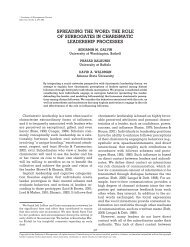
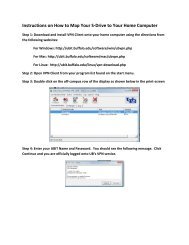
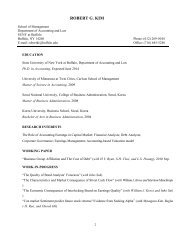

![CRC Newsletter [PDF] - University at Buffalo School of Management](https://img.yumpu.com/34736697/1/190x245/crc-newsletter-pdf-university-at-buffalo-school-of-management.jpg?quality=85)

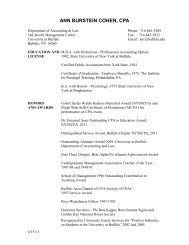
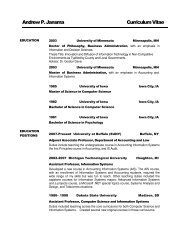

![Program [PDF] - University at Buffalo School of Management](https://img.yumpu.com/24102928/1/190x190/program-pdf-university-at-buffalo-school-of-management.jpg?quality=85)
